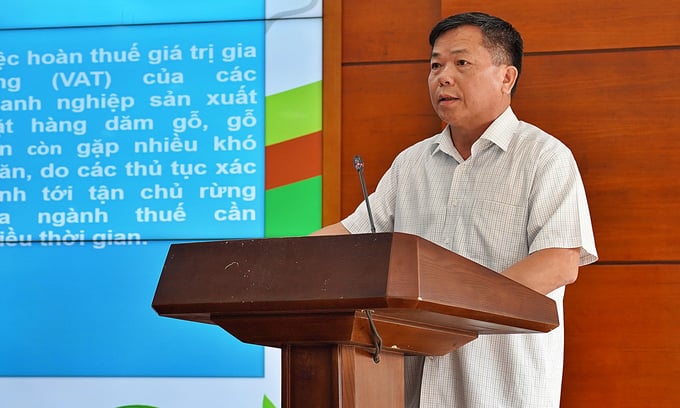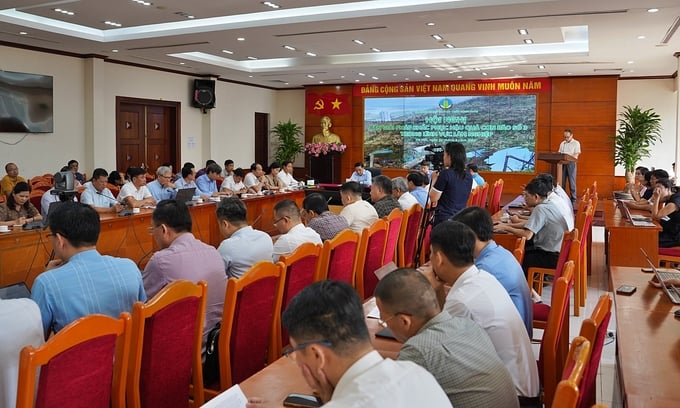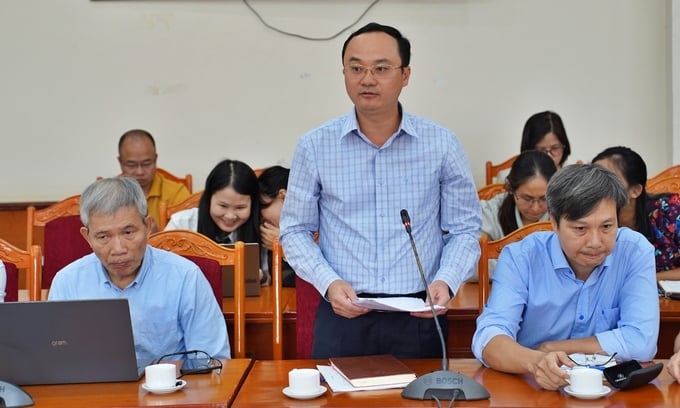May 20, 2025 | 04:51 GMT +7
May 20, 2025 | 04:51 GMT +7
Hotline: 0913.378.918
May 20, 2025 | 04:51 GMT +7
Hotline: 0913.378.918

Deputy Director of the Department of Forestry Trieu Van Luc providing a report on the nationwide forest damage caused by Typhoon No. 3. Photo: Bao Thang.
The Department of Forestry held a conference on the morning of September 24 to discuss solutions for restoring and stabilizing forestry production following Typhoon No. 3. During the event, Trieu Van Luc, Deputy Director of the Department of Forestry, reported that by 4 p.m. on September 23, a total of 13 provinces and cities had suffered damage totaling nearly 170,000 hectares of forest. Notably, this figure does not include areas of natural forest affected by landslides.
Accordingly, the most heavily affected regions include Quang Ninh with over 110,000 hectares, Bac Giang with over 26,000 hectares, Lang Son with nearly 20,000 hectares, and Hai Phong with over 10,000 hectares.
Official data on damage to wood and forestry product processing businesses is currently unavailable. However, preliminary estimates indicate that Typhoon No. 3 has caused significant damage to businesses in the northern mountainous provinces.
The majority of plywood, timber, and veneer manufacturing businesses in these regions have poorly constructed facilities, rendering them vulnerable to roof damage during the typhoon, followed by landslides due to flooding. Accordingly, the typhoon has caused extensive damage to 200 businesses, with an estimated financial loss of approximately 40 billion VND.
Regarding the impact of the typhoon in the near future, Deputy Director Luc expected the supply of raw wood materials for the wood processing industry to drop significantly. Specifically, the typhoon has damaged nearly 12 million cubic meters of raw timber (small timber).

The conference saw the participation of more than 100 delegates and multiple remote connections from various provinces. Photo: Bao Thang.
On the other hand, the cost of harvesting and transporting fallen trees has increased, whereas the value of raw timber from these trees has declined, leading to a downward trend in the raw wood supply chain.
Woodchip, plywood, and veneer manufacturing businesses have suffered damage to their machinery, equipment, products, and infrastructure. The export value of woodchips, pellets, and boards is projected to decrease by approximately 300 million USD by the end of 2024.
Typhoon No. 3. has also affected several local forestry projects. The "Forestry Sector Modernization and Coastal Resilience" (FMCR) project has experienced significant damages in the provinces of Quang Ninh, Hai Phong, and Thanh Hoa.
Preliminary inspections revealed that expansive areas of mangrove forests planted under the project have been washed away or damaged by waves. Due to heavy rain, floods, and rising tides, project staff in Quang Ninh Province have been unable to access the project site to assess and determine the damage caused by the storm.
Stakeholders in Bang La Ward, Do Son District, Hai Phong Province, conducted an on-site inspection on 30% of the planted forests located 1.5 to 3 kilometers from the dyke. The inspection yielded an estimated damage of approximately 80%. Similarly, the damage level in Tan Thanh Ward, Duong Kinh District, ranged from 50% to 90%.
Thanh Hoa Province houses 395 hectares of planted forest area, including nearly 285 hectares of mangrove forest and more than 110 hectares of upland forest. Initial inspections in Da Loc Commune, Hau Loc District, showed that over 40 hectares of the local planted mangrove forest area have suffered more than 70% damage.

Deputy Director Vu Duy Van: "Quang Ninh’s forest coverage rate may decrease by 10%." Photo: Bao Thang.
In addition to FMCR, the "Rehabilitation and Sustainable Management of Mangrove Forests in the Red River Delta" (KFS) project, implemented in Nam Dinh and Ninh Binh with a total investment capital of 4.4 million USD, has also reported experiencing damages. However, the damage to local forest areas was minimal.
Vu Duy Van, Deputy Director of the Quang Ninh Province's Department of Agriculture and Rural Development, reported that planted forests experienced the most significant damages. The most severely affected natural forests suffered 30% damage. "With over 110,000 hectares of affected forest area, Quang Ninh Province estimates that the forest coverage rate can potentially decrease by more than 10%," Deputy Director Van added.
Tu Quoc Huy, General Director of the Bac Giang Province's Sub-Department of Forest Protection, acknowledged that the province might see a 10% reduction in forest coverage in the short term. Additionally, General Director Huy requested that the Ministry of Agriculture and Rural Development provide further guidance on reforestation activities and issue specialized policies to support local governments as immediately as possible.
Tran Quang Bao, General Director of the Department of Forestry, estimated that with the fast-growing tree plantation cycle of 5 to 7 years, the supply of raw timber from domestic plantations is projected to decline by approximately 3.5 million cubic meters per year. This reduction can be attributed to the replanting needs for areas damaged by the storm, which will require 5 to 7 years to reach harvestable maturity.
Translated by Nguyen Hai Long

(VAN) This was the assessment shared by experts at the workshop titled 'Assessing the Role and Potential of Low-Emission Rice Production Systems in Vietnam,' held on the morning of May 19.

(VAN) Cai Rong Port is the fisheries control center of Quang Ninh, helping to monitor fishing vessels, combat IUU fishing, and remove the EC's 'yellow card'.

(VAN) The German Agricultural Society (DLG) explores the possibility of establishing a mechanization service center in Vietnam’s Mekong Delta to support farmers in accessing and utilizing advanced machinery.

(VAN) On May 16, the Department of Water Resources Management, in collaboration with the Food and Agriculture Organization of the United Nations (FAO), held a signing ceremony for the GEF-8 project document.

(VAN) Food safety, mechanization, vocational training, and market opening are key areas of cooperation expected between the Vietnamese Government and the Federal Republic of Germany.

(VAN) Deputy Minister Nguyen Quoc Tri also expressed his hope that Cuba will soon overcome its current challenges, attain food security, and further expand cooperation with Vietnam.

(VAN) The project contributes to enhancing the resilience of communities vulnerable to the impacts of climate change, with a primary focus on local women.